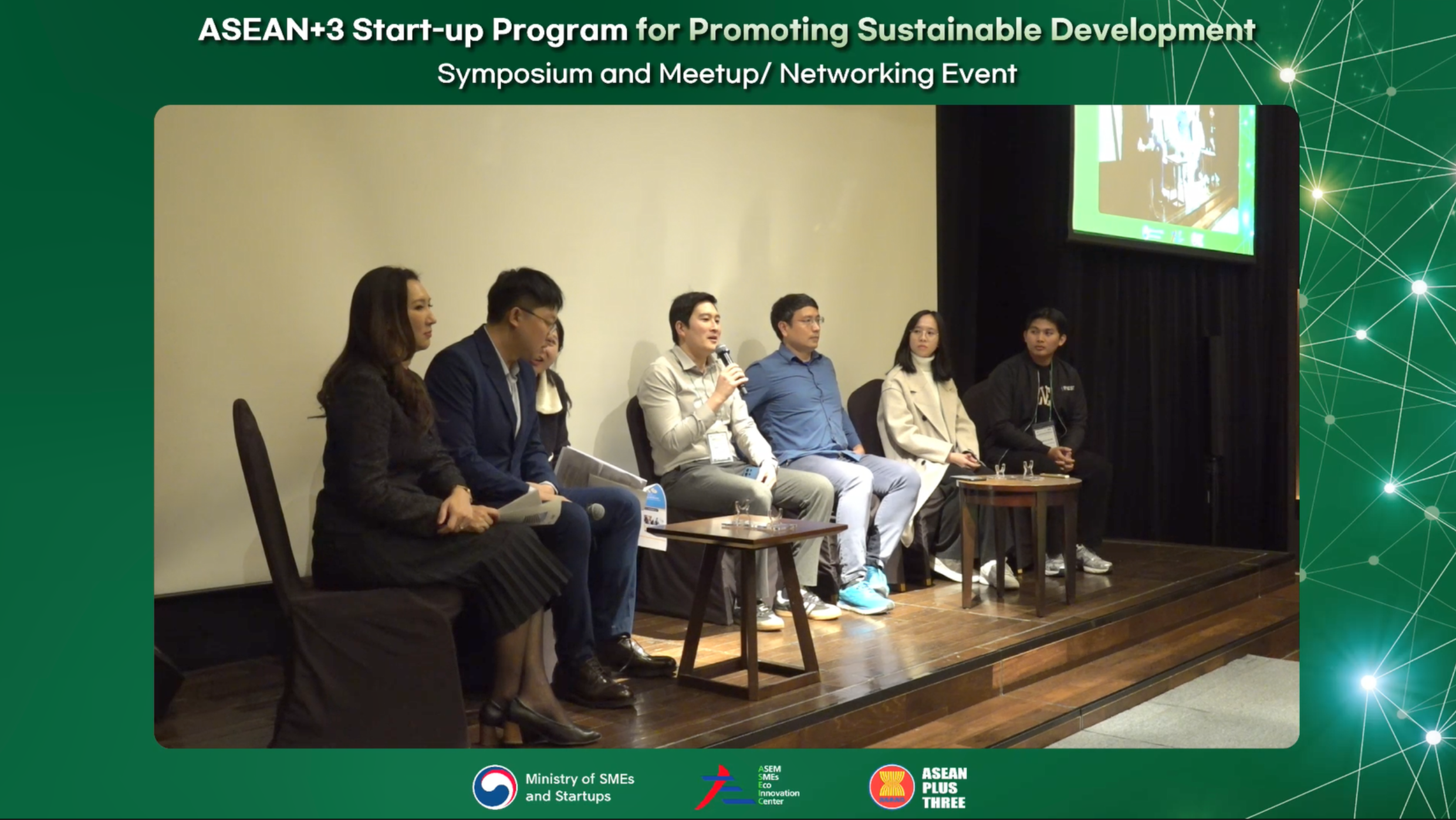[Jan16/Symposium and Meetup/Networking Event] Summary of Case Study 4 (Well-being)
- 2025.03.12
- 관리자
Case Study 4. Deep-tech Startups for WELL-BEING
*Moderator: Mrs. Sansanee HUABSOMBOON (Study Group Member)
Mr. Guanyu BAO, CEO, Baocase, China
Mr. Sean PARK, Business Strategy Team Leader, eMotiv, Republic of Korea
Mr. Anh Tuan CAO, CEO, LIFE AI, Viet Nam
Ms. Hong CHHENG, Procurement Manager, PillTech, Cambodia
Mr. PG MD Nazrul Azmi PG LADEMAN, COO, RVEST, Brunei Darussalam
Panel Discussion
Q. What is the most important aspect of running a business, or the biggest challenge to overcome?
A. [eMotiv] For startups, securing sufficient capital and ensuring market access for their products are crucial. Additionally, finding good teammates and maintaining resilience are key factors for success. Startups must always be prepared for potential failures.
[LIFE AI] Understanding cultural differences for global expansion and complying with regulations in different countries.
[PillTech] Challenges in operations, as well as understanding and targeting potential customers.
[Rvest] Understanding the first customers who can pave the way for future ones is most challenging aspect for startups. Addressing issues related to regulations, awareness, and technical support. here is a lack of awareness about rainwater recycling systems, and support for system implementation is needed.
Q. How can ASEAN help startups expand into global markets?
A. [LIFE AI] Hosting more events and creating a platform to connect startups with potential users. Governments should provide market research and share successful startup cases. [PillTech] Sharing insights on regulations and laws across different countries, improving accessibility to policy and legal information.
[eMotiv] Global expansion is possible through customer experience-driven product development, and localized strategies considering cultural characteristics are essential.
[Rvest] Networking sessions are most helpful for expansion.
Q: What challenges do digital healthcare startups face?
A. [eMotiv] Facing challenges related to regulations, policies, clinical trials, and social biases. In Korea, there are regulations in place to help and support healthcare startups. However, at the same time, they also want to ensure that the software we have is secure enough. It is necessary to improve awareness among patients and doctors regarding digital healthcare. Overall, support in the healthcare sector is expected to improve in the future.
[LIFE AI] Encountering strict regulations and differing government priorities across countries. Compliance with regulations and collaboration with governments are crucial. Lowering regulatory barriers in fields such as genetic testing is especially important. In general, regulations apply only to genetic testing, even though all mandatory health tests are the same. I believe that Korea and Singapore have stricter regulations compared to other countries.
[PillTech] Legal and regulatory compliance is the biggest challenge, particularly in pharmaceutical distribution and quality control, which are subject to complex regulations.
[RVEST] Sharing each country’ regulations could be helpful for startups to better undertand market entry strategies.
/End/
*Moderator: Mrs. Sansanee HUABSOMBOON (Study Group Member)
Mr. Guanyu BAO, CEO, Baocase, China
Mr. Sean PARK, Business Strategy Team Leader, eMotiv, Republic of Korea
Mr. Anh Tuan CAO, CEO, LIFE AI, Viet Nam
Ms. Hong CHHENG, Procurement Manager, PillTech, Cambodia
Mr. PG MD Nazrul Azmi PG LADEMAN, COO, RVEST, Brunei Darussalam

Panel Discussion
Q. What is the most important aspect of running a business, or the biggest challenge to overcome?
A. [eMotiv] For startups, securing sufficient capital and ensuring market access for their products are crucial. Additionally, finding good teammates and maintaining resilience are key factors for success. Startups must always be prepared for potential failures.
[LIFE AI] Understanding cultural differences for global expansion and complying with regulations in different countries.
[PillTech] Challenges in operations, as well as understanding and targeting potential customers.
[Rvest] Understanding the first customers who can pave the way for future ones is most challenging aspect for startups. Addressing issues related to regulations, awareness, and technical support. here is a lack of awareness about rainwater recycling systems, and support for system implementation is needed.
Q. How can ASEAN help startups expand into global markets?
A. [LIFE AI] Hosting more events and creating a platform to connect startups with potential users. Governments should provide market research and share successful startup cases. [PillTech] Sharing insights on regulations and laws across different countries, improving accessibility to policy and legal information.
[eMotiv] Global expansion is possible through customer experience-driven product development, and localized strategies considering cultural characteristics are essential.
[Rvest] Networking sessions are most helpful for expansion.
Q: What challenges do digital healthcare startups face?
A. [eMotiv] Facing challenges related to regulations, policies, clinical trials, and social biases. In Korea, there are regulations in place to help and support healthcare startups. However, at the same time, they also want to ensure that the software we have is secure enough. It is necessary to improve awareness among patients and doctors regarding digital healthcare. Overall, support in the healthcare sector is expected to improve in the future.
[LIFE AI] Encountering strict regulations and differing government priorities across countries. Compliance with regulations and collaboration with governments are crucial. Lowering regulatory barriers in fields such as genetic testing is especially important. In general, regulations apply only to genetic testing, even though all mandatory health tests are the same. I believe that Korea and Singapore have stricter regulations compared to other countries.
[PillTech] Legal and regulatory compliance is the biggest challenge, particularly in pharmaceutical distribution and quality control, which are subject to complex regulations.
[RVEST] Sharing each country’ regulations could be helpful for startups to better undertand market entry strategies.
/End/
Comments
Delete Comment
You must enter a password to delete this comment.
- Password
